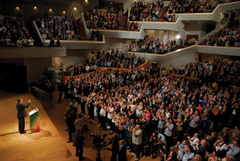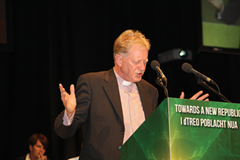Sinn Féin ard fheis: Towards a new Republic
 Meadhbh Monahan reports on the Sinn Féin ard fheis, where a sense of ‘getting on with it’ pervaded the proceedings.
Meadhbh Monahan reports on the Sinn Féin ard fheis, where a sense of ‘getting on with it’ pervaded the proceedings.
Republicanism is not about “a line on a map”, it is about people, fairness and equality, Martin McGuinness told delegates at the annual Sinn Féin ard fheis in Belfast’s Waterfront Hall.
‘Towards a new Republic’ was the slogan of this year’s event; the first to be held in Northern Ireland, where an address by a Presbyterian minister was the biggest talking point.
Despite the fact that Sinn Féin is an all- Ireland party, there remained a slight sense of disparity between MLAs who were focused on the Executive and TDs who were in opposition mode, attacking the Irish Government’s acquiescence to the EU-IMF bailout. Also, while McGuinness referred to unionists as “brothers and sisters to be loved and cherished as we travel on our journey to a new Republic,” Gerry Adams harkened to the party’s more traditional rhetoric, saying: “The Orange state is no more.
This ard fheis, your presence [in Belfast] is further proof of that.”
In his speech on the opening night of the conference, the Reverend David Latimer of First Derry Presbyterian Church embraced McGuinness and referred to him as “one of the true great leaders of modern times.” In an otherwise uncontroversial address Latimer apportioned blame for the Troubles to both sides of the community saying: “By our silence and by our actions, we have together contributed to perpetuating the divisions created, probably at the 1609 settlement of Ulster. That progressively plunged us into the chaos and into the turmoil of the past.”
The DUP was challenged to invite a Catholic priest to address a party conference this year or next and Latimer called for a public day for hope and transformation that would allow everybody involved in the conflict to “acknowledge the pain that each has inflicted … and that we all need to forgive.”
His address received applause and cheers from delegates but the News Letter’s editorial the following Monday summed it up as “a missed opportunity to gain some ground.” It added that the speech did not represent the views of Latimer’s community. The Irish News’ editorial on the same day concluded that the speech was focused on symbolism rather than substance. It suggested that the country-wide day for hope and transformation is worthy of discussion but found the address bland and unchallenging for Sinn Féin.
A new republic, as outlined by the deputy First Minister, would “offer hope to those currently under pressure”. It would be based on equality and fairness and would be “rebuilt and renewed by citizens who will make it our own.”
Gerry Adams’ speech on the Saturday night hinted that the ard chomhairle would select a presidential candidate the following week. He said the party should support the nomination of a candidate “who is capable of winning the support of progressive and nationalist opinion and who will reflect the broad republican spirit of the Irish people at this time.”
That was to be Martin McGuinness whose entry into the presidential campaign has ignited intense scrutiny into his past involvement in the IRA.
Referring to Belfast’s “proud republican history”, Adams name-checked Protestant republicans Henry Joy McCracken, Mary Anne McCracken and William Drennan.
Time constraints, due to live transmission on RTÉ, resulted in the Louth TD focusing on issues facing the Republic: emigration, the bailout, Sinn Féin’s pledge to “grow our way to recovery” through the agri- food sector and the forthcoming Dublin West by-election.
Adams’ “personal priority” is to reach out to unionists so both sides “understand how we have hurt each other” and listen to each other. His message to the British Government was that it should “leave the people of this island to manage our own affairs.”
Agriculture Minister Michelle O’Neill called for ambitious, strategic plans across the island that would see the agri- food sector become an economic driver while the other sectors recover. She called for a ‘team Ireland’ approach to be taken to the review of the EU Common Agricultural Policy.
Education Minister John O’Dowd said that young people who value themselves will value their family, their school and community. There was no mention of integrated education. However he did say that through education, Sinn Féin “can tackle discrimination and instil an ethos of equality.”
Culture Minister Carál Ní Chuilín said she is committed to the “rich cultural and linguistic heritage on this island” but predictably only discussed the Irish language and described Líofa 2015, an initiative to help support 1,000 people from Northern Ireland to be fluent in Irish by 2015.
Policing Board member Gerry Kelly called for Police Ombudsman Al Hutchinson to resign and claimed that Matt Baggott must “face down the dinosaurs” who wanted to return policing to “a force within a force” mentality.
One of the party’s brightest sparks in the Dáil is Donegal South West TD Pearse Doherty. He claimed that Sinn Féin would spend €7 billion from the pension reserve fund to create jobs and establish an independent distressed mortgage resolution body.
Another up and coming TD is Cork North Central’s Jonathan O’Brien, who highlighted a worrying increase in the use of heroin in his constituency as people become more financially desperate. He criticised the Republic’s justice system whereby drug dealers are receiving suspended sentences while others are being locked up for failure to pay their bills.
Vice-President Mary Lou McDonald gave a rousing attack on the Fine Gael-Labour coalition saying that “the ordinary people have taken enough.” Sinn Féin “stand shoulder to shoulder with them and if you come after them again, we’ll come right back at you.”
During the course of the weekend, where no alcohol was served during proceedings, delegates voted on 198 motions on education, uniting Ireland, culture, international affairs, housing, political reform, and legacy and truth.
A motion on Libya opposed NATO’s bombing campaign and called on all parties in Libya to resolve the conflict through peaceful dialogue and negotiation. The IRA was, of course, backed by the Gaddafi regime. However, other actors in the peace process have also worked with that regime.
Accepted motions included a new online communications strategy because “the party is not investing adequate resources into making the best possible use of online communications, including the party’s own website and social media.”
Those that were defeated included imposing a quota of 80 per cent of all first time candidates to be under the age of 33 in the 2014 Irish local elections.
This was a party gaining confidence in the Republic due to its success in the general election and its capacity for more gains in the Presidential race at Fianna Fáil’s expense, and one comfortable in its power-sharing role in Northern Ireland.
At present Sinn Féin has one MEP, three senators, five MPs, 29 MLAs (including those MPs) and 14 TDs.






